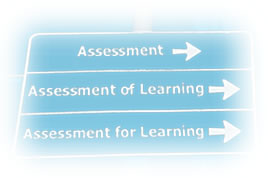

Links - Papers and Articles - Others
Angelo, T. A. (1999). Doing assessment as if learning matters most ![]()
The author believed that, in order to achieve transformation in higher learning, we must develop shared trust, a transformative vision of goals worth working toward, and a shared language and set of concepts equal to the challenge. If we plan and conduct our assessment projects at every step as if learning matters most, then the distance between means and ends will be reduced and our chances of success increased.
Bond, T. G. (2005). How can large scale assessments help improve teaching and learning in the classroom? Paper presented at the The "Assessment Reform in Hong Kong" Seminar (September 24, 2005), The Hong Kong Institution of Education, Hong Kong.
Boud, D. (2000). Sustainable Assessment: rethinking assessment for the learning society. Studies in Continuing Education, 22, 2, 151-167 ![]()
The article emphasis on the role of assessment, which needs to meet both the specific and immediate goals of a course as well as establishing a basis for students to undertake their own assessment activities in the future
CDC. (2000). Learning to Learn - The Way Forward in Curriculum development. Consultation document, Hong Kong SAR: The Government Printer ![]()
Cowie, B. (2005). Student commentary on classroom assessment in science: a sociocultural interpretation. International Journal of Science Education, 27(2), 199 - 214.![]()
This paper draws on data generated through student interviews and classroom observations to present student perceptions of their assessment in science lessons. The argument in the paper is grounded in and evolved out the use of a sociocultural perspective to make sense of the student data
Curriculum Development Council (2002) Basic education curriculum guide - Building on strengths ![]()
Graham, G. & Claire, S. (2003). Does your assessment support your students' learning. Keynote presentation at Teaching Conference, Queen's University, Belfast.![]()
This article focuses on the evaluation of assessment arrangements and the way they affect student learning out of class. It proposes a set of !˘FDconditions under which assessment supports learning!| and justifies these with reference to theory, empirical evidence and practical experience. These conditions are offered as a framework for teachers to review the effectiveness of their own assessment practice.
Greer, L. (2001) Does Changing the Method of Assessment of a Module Improve the Performance of a Student? Assessment & Evaluation in Higher Education, 26(2), 127-138 ![]()
This paper assesses the impact of changing the mode of in-course assessment on the performance of a student in the end of semester examination. The results seem to suggest that changing the mode of assessment can affect the performance of students. However, care must be taken in evaluating the results as other factors such as motivation and academic ability could impinge on this data.
Hall, K. (2001). Level Descriptions and Curriculum Relatedness in English at Key Stage 1. Educational Review, 53(1), 47-56 ![]()
The focus in this paper is on the curriculum relatedness of the Level Descriptions (LDs) and the extent to which teachers' assessment practice is criterion referenced
IBM (2003). Strategic review of Hong Kong Examinations and Assessment Authority ![]()
A report released in May 2003, with the aims to strengthen the Authority's role in assessment policy and improve the internal operation of the Authority. In addition, closer work collaboration between HKEAA and the Curriculum Development Institute with focus on new developments in assessments have been proposed.
James, M., & Gipps, C. (1998). Broadening the basis of assessment to prevent the narrowing of learning. Curriculum Journal, 9 (3), 285-297. ![]()
Kam, K. S. (2005). Curriculum reform - Changing assessment practices. Paper presented at the The "Assessment Reform in Hong Kong " Seminar, The Hong Kong Institute of Education, Hong Kong . Leadbeater, C. ( 2004 ). Learning About Personalisation. London : Demos. ![]()
Mok, M. M. C. (2005). Learning Oriented Assessment. Paper presented at the The "Assessment Reform in Hong Kong " Seminar ( September 24, 2005 ), The Hong Kong Institute of Education, Hong Kong .
Poehner, M. E. & Lantolf, J. P. (2005). Dynamic assessment in the language classroom. Language Teaching Research, 9(3), 233-265. ![]()
The focus of this paper is on the implementation of Dynamic Assessment (henceforth, DA) in the L2 classroom setting. DA is an approach to assessment and instruction derived from Vygotsky's theory of the Zone of Proximal Development (henceforth, ZPD)
Skidmore, P. ( 2003 ). Beyond Measure: Why Educational Assessment Is Failing the Test. London : Demos. ![]()
Stokking K. (2004) Teachers' assessment of students' research skills, British Educational Research Journal, 30: 1, pp. 93-116 ![]()
Stewart, M. S., Bond, M. H., Deeds, O., Westrick, J., & Wong, C. M. (1999). Predictors of high school achievement in a Hong Kong international school. International Journal of Psychology, 34 (3), 163-174. ![]()
Wiliam, D. ( 2000 ). Reliability, Validity and all that Jazz. Education 3 - 13 , 29 ( 3 ), 9 - 13 . ![]()
Wiliam, D. ( 2000 ). The meanings and consequences of educational assessments. Critical Quarterly, 42 ( 1 ), 105 - 127 . ![]()
Wiliam, D. ( 2001 ). Level best? Levels of attainment in national curriculum assessment. London : Association of Teachers & Lecturers. ![]()
Woolf, H. (2004). Assessment criteria: reflections on current practices. Assessment & Evaluation in Higher Education, 29(4), 479-493 ![]()
This article reviews the findings of a small-scale investigation into the criteria used by a number of SACWG departments for assessing final-year project modules in business and history and other written history assignments.
Home | Purposes | Background | Research Plan | Team | Schools | Works | Links